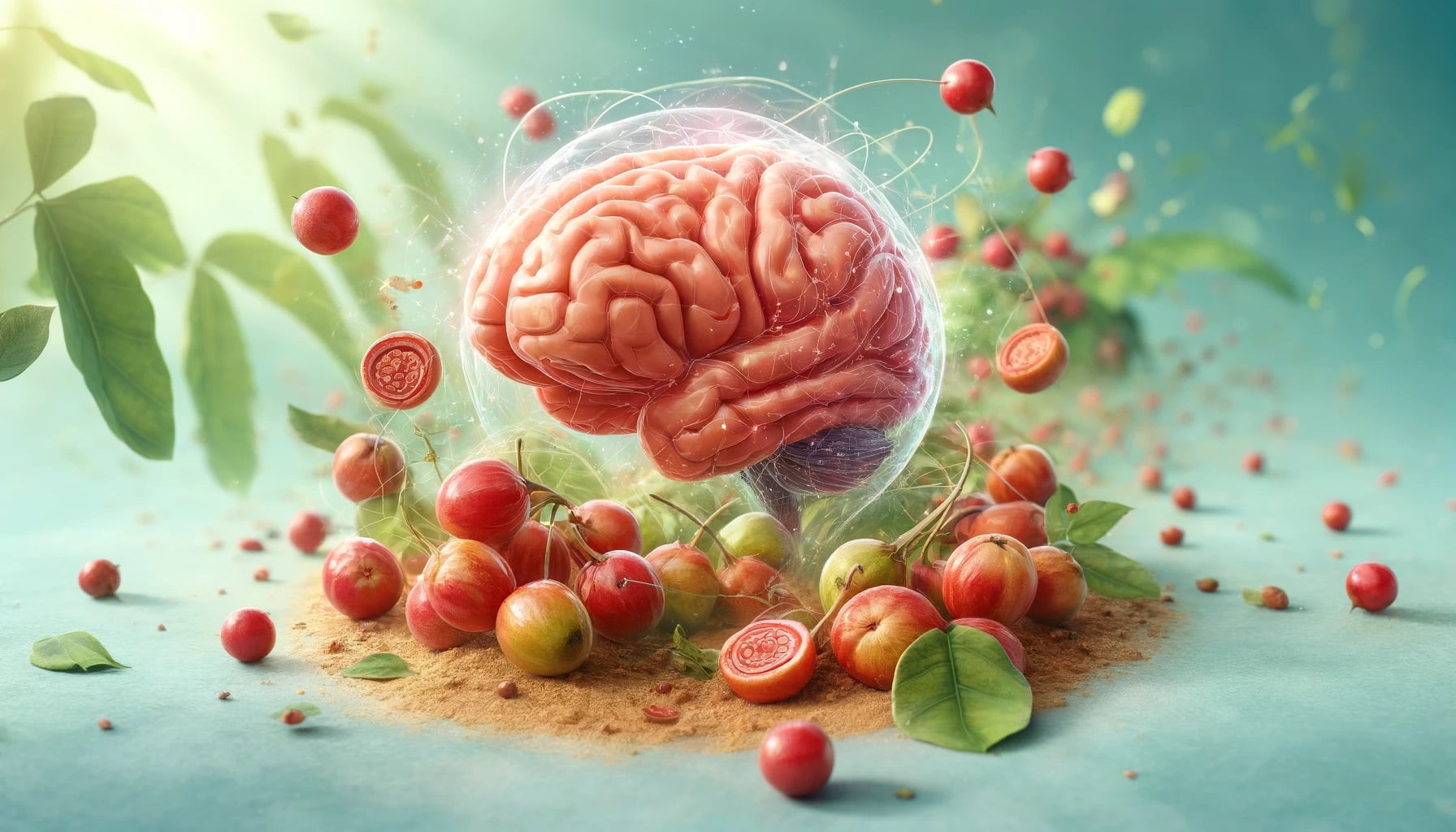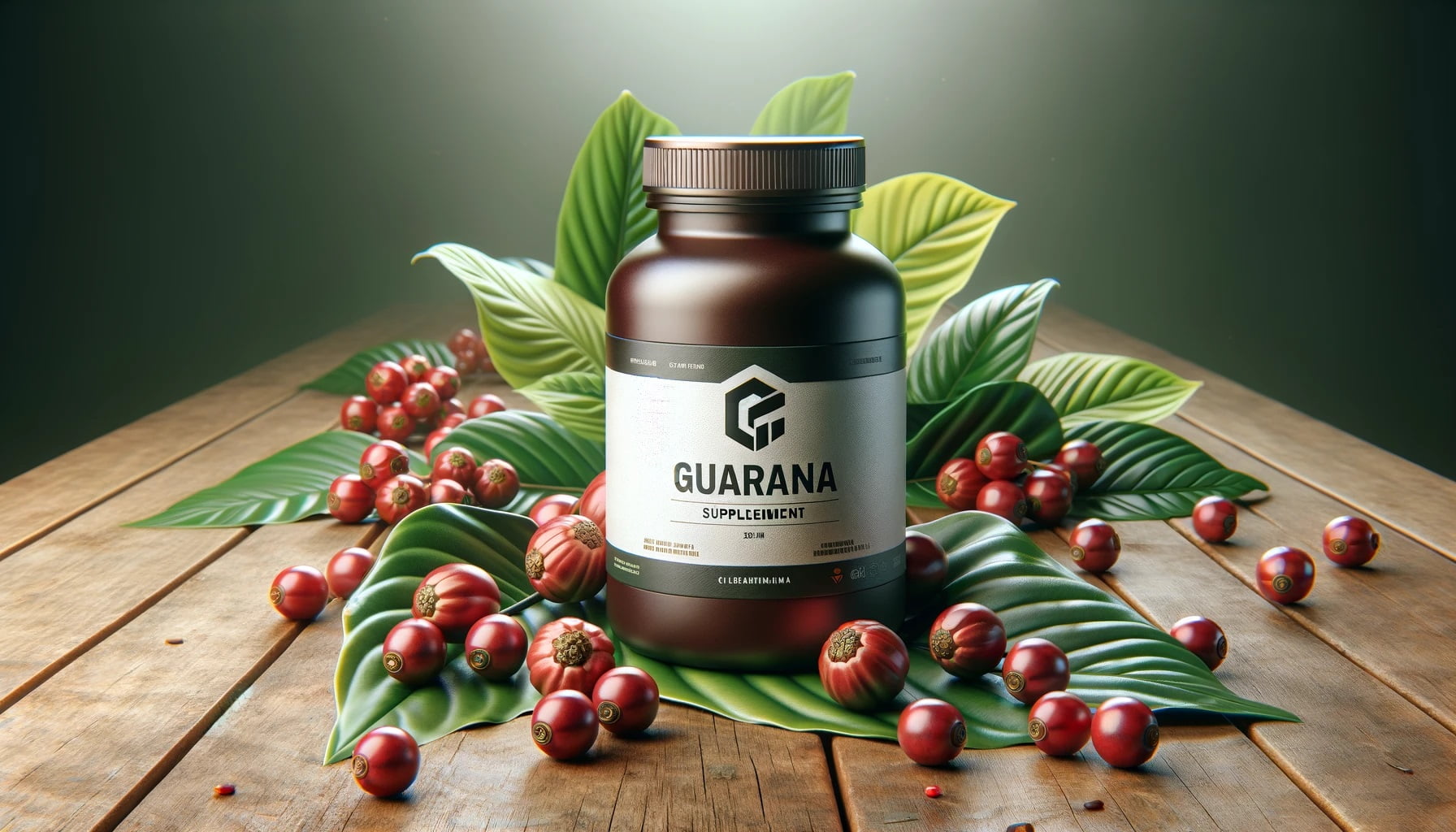
Guarana, a plant native to the Amazon, offers potent cognitive benefits due to its high caffeine content and rich blend of bioactive compounds.
This natural nootropic enhances mental alertness, focus, memory, and learning while potentially protecting against neurodegenerative disorders.
Guarana’s unique properties set it apart from other natural and synthetic nootropics, providing immediate and broad-spectrum cognitive enhancement.
However, users should know the proper dosage, timing, and potential side effects when incorporating guarana into their cognitive enhancement regimen.
Table of Contents
What is Guarana?
Guarana (Paullinia cupana – family: Sapindaceae) is a climbing plant native to the Amazon basin, particularly in Brazil. It is best known for its stimulant properties.
The plant produces small, red fruit containing black seeds rich in caffeine and other antioxidant and anti-inflammatory biocomponents.

Guarana is a popular herbal tea to stave off extra weight and boost cardiovascular health. It is great for older people because of its protection against Alzheimer’s and Parkinson’s diseases.
Research supports these unsurmountable benefits, highlighting guarana’s ability to enhance mental performance, as a valuable workout supplement.
What are the Traditional Uses of Guarana?
Traditionally, guarana has been consumed to treat headaches, fever, and muscle pain, owing to its analgesic and anti-inflammatory effects. It was also used in traditional medicine to treat digestive ailments, such as diarrhea.
Modern traditional uses of guarana also include treating headaches, reducing fever, and alleviating menstrual pain. Its antimicrobial and astringent properties make it useful in treating wounds and preventing infections.
What are the Active Compounds Found in Guarana?
Guarana contains several bioactive compounds that contribute to its stimulant and nootropic effects. The most notable compounds include:
- Caffeine (3.6-5.8%): Potent simulant
- Tannins (6.5-8%): Polyphenolic compounds known for their antioxidant and anti-inflammatory effects
- Theobromine and Theophylline: Caffeine-like stimulants
- Saponins: Neuroprotective and cognitive-enhancing agents
Guarana is also a rich source of antioxidants, including catechins, phenols, bioflavonoids, epicatechins, and proanthocyanidins, which help combat oxidative stress and inflammation.
What Are the Nootropic and Health Benefits of Guarana?
Guarana offers a range of cognitive and health benefits, leveraging its high caffeine content and rich blend of bioactive compounds.
From enhancing mental alertness to supporting long-term brain health, its unique properties set the stage for its multifaceted advantages.

How Can Guarana Enhance Mental Alertness and Focus?
Guarana contains high caffeine content, which enhances mental alertness. Caffeine acts on the central nervous system by blocking adenosine receptors, which increases neurotransmitter activity, particularly dopamine, norepinephrine, and acetylcholine. This results in improved alertness, concentration, and reduced fatigue.
A study found that a single dose of guarana (75 mg) significantly improved task performance, attention, and memory in healthy adults.(1)
Guarana has theobromine, a milder stimulant, that complements caffeine’s effects. It does that by increasing blood flow to the brain. Other compounds in guarana, such as catechins and tannins, protect the brain from oxidative stress.
How Does It Enhance Memory and Learning?
Memory and learning have diverse mechanisms. Guarana improves short-term memory, working memory, and information processing speed.
Additionally, catechins and proanthocyanidins, protect the brain cells from oxidative stress and promote neuroplasticity, which enhances memory functions. These effects are crucial in preventing age-related cognitive decline and enhancing brain function.
A study demonstrated that a multi-vitamin/mineral supplement containing guarana improved memory performance and reduced mental fatigue in healthy adults.(2)
Furthermore, boosting the release of the neurotransmitters dopamine and norepinephrine contributes to improved mood and motivation.
Does Guarana Protect from Neurodegenerative Disorders?
Evidence suggests that guarana protects against neurodegenerative disorders, such as Alzheimer’s and Parkinson’s disease. The antioxidants in guarana combat oxidative stress, which is a key factor in the development of these disorders.
A study found that guarana extract protected against neuroinflammation and oxidative stress in a mouse model of Parkinson’s disease.(3)
Another study found that caffeine consumption was associated with a lower risk of developing Alzheimer’s disease.(4)
Additionally, caffeine’s neuroprotective properties help reduce the risk of developing neurodegenerative diseases. It works by blocking adenosine receptors, reducing neuroinflammation, and modulating dopamine, which is depleted in such neurodegenerative conditions.
How to Use Guarana for Cognitive Enhancement?
When using guarana for cognitive enhancement, it’s important to consider the dosage, timing, and method of consumption.
Managing food intake, time of ingestion, and variability in the metabolism of different individuals are key to understanding its optimal use.

What is the Recommended Dosage for Cognitive Benefits?
The optimal Guarana dosage varies depending on factors such as body weight, tolerance, and sensitivity to caffeine.
Studies show that doses ranging from 37.5-300mg can provide cognitive benefits. They also suggest a lower dosage of 75-100 mg for people with high caffeine consumption.(5)
It’s recommended to start with a lower dose (50-100mg) and gradually increase it as needed.
How Long Does It Take to See Cognitive Benefits?
The cognitive benefits of guarana can be observed within 30-60 minutes of consumption to reach peak levels in the bloodstream.
The effects typically last for 4-6 hours, depending on the individual’s metabolism and tolerance.
How Should Guarana Be Taken for Best Results?
For optimum results, guarana should be taken on an empty stomach, as food can slow down its absorption.
Another suggestion is to consume guarana earlier in the day to avoid sleep disruption, as its stimulant effects can last for several hours.
Are There Any Risks Associated with Guarana?
Usually, moderate doses pose no risks. However, some consideration is advised for people prone to certain health conditions.
A wiser practice is to administer it in close consultation with a healthcare professional.
What are the Common Side Effects of Guarana?
The most common side effects of guarana are related to its caffeine content and may include:
- Insomnia or sleep disruption
- Anxiety and restlessness
- Increased heart rate and palpitations
- Digestive issues, such as upset stomach and diarrhea
- Headaches and migraines
- Dehydration and increased urination
These side effects are more likely to occur when guarana is consumed in high doses or by individuals sensitive to caffeine.
Is Guarana Safe for Long-Term Use?
Guarana is safe for long-term use when consumed in moderation. However, chronic high-dose consumption may lead to caffeine dependence, tolerance, and withdrawal symptoms upon cessation.
Long-term excessive use may also increase the risk of adverse health effects, such as sleep disorders, anxiety, and cardiovascular issues. It’s important to monitor your intake and be aware of any potential side effects.
Who Should Avoid Using Guarana?
Certain individuals should avoid or limit their guarana intake, including:
- Pregnant and nursing women
- Children and adolescents
- People with caffeine sensitivity or intolerance
- Individuals with anxiety disorders or panic attacks
- Those with hypertension or other cardiovascular conditions
- People taking certain medications
Can Guarana Interact with Medications and Other Supplements?
Yes, guarana can interact with certain medications and supplements due to its caffeine content. Some notable interactions include:
- Stimulant medications (e.g., Adderall, Ritalin): Possibility of high interaction
- Blood thinners (e.g., warfarin): Raises the risk of bleeding
- Antidepressants (e.g., MAOIs, SSRIs): Increases the risk of serotonin syndrome
- Herbal supplements (e.g., ephedra, yohimbe): Heightened risk of adverse effects
How Does Guarana Compare with Other Nootropics?
Guarana stands out among nootropics due to its unique blend of stimulating and cognitive-enhancing properties.
Unlike many nootropics that focus on long-term brain health or specific cognitive functions, guarana offers immediate and broad-spectrum cognitive benefits. This sets the stage for understanding its distinct advantages and how it measures up to other natural and synthetic nootropics.
How Does Guarana Compare with Other Natural Nootropics?
Guarana has an abundant caffeine content and synergistic effects with other bioactive compounds. Some comparisons include:
- Ginkgo biloba: Offers more long-term neuroprotective benefits
- Bacopa monnieri: Provides more sustained cognitive benefits however, lacks the immediate stimulant effects
- Lion’s mane mushroom: Stimulates nerve growth factor (NGF) and promotes neurogenesis
How Does Guarana Compare with Synthetic Nootropics?
Guarana offers a more natural and consistent option for cognitive enhancement. However, synthetic nootropics may provide more targeted and potent effects. Some comparisons include:
- Modafinil: Prescription drug for better wakefulness and cognitive functions. Has a higher risk of side effects.
- Racetams (e.g., piracetam, aniracetam): Known for their memory-enhancing capabilities. They lack the stimulant effects.
- Noopept: Enhances attention span and overall cognitive functions. Higher potential for side effects.
Ultimately, the choice between guarana and other nootropics depends on individual goals, preferences, and tolerance.
- Kennedy, David O., et al. “Improved cognitive performance in human volunteers following administration of guarana (Paullinia cupana) extract: comparison and interaction with Panax ginseng.” Pharmacology Biochemistry and Behavior 79.3 (2004): 401-411.↩
- Haskell, Crystal F., et al. “A double-blind, placebo-controlled, multi-dose evaluation of the acute behavioural effects of guaraná in humans.” Journal of psychopharmacology 21.1 (2007): 65-70.↩
- Eskelinen, Miia H., and Miia Kivipelto. “Caffeine as a Protective Factor in Dementia and Alzheimer’s Disease.” Journal of Alzheimer’s Disease, vol. 20, no. s1, 2010, pp. S167-S174. doi:10.3233/JAD-2010-091249.↩
- Ruchel, Jader B., et al. “Lipotoxicity-associated inflammation is prevented by guarana (Paullinia cupana) in a model of hyperlipidemia.” Drug and Chemical Toxicology 44.5 (2021): 524-532.↩
- Haskell, C. F., et al. “Behavioural effects of compounds co-consumed in dietary forms of caffeinated plants.” Nutrition research reviews 26.1 (2013): 49-70.↩

